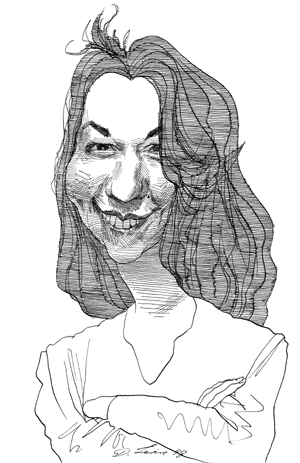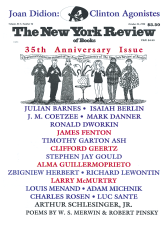Lorrie Moore is good at bad jokes. She’s good at good jokes, too, and makes many of them. But good jokes are the sign of a certain control over the world, or at least of a settled vision, the sort of vision a writer has. Good jokes are finally just jokes; whereas bad jokes are more revelatory of character and situation. Wonky puns, look-at-me one-liners, inappropriately perky comebacks: these don’t necessarily denote lack of humor, more a chin-up flailing at the discovery that the world is not a clean, well-lighted place; or that it is for some, but not for you, as the light falls badly on you and mysteriously casts no shadow.
Birds of America, Moore’s third collection of stories, is cleverly laid out. It begins with seven stories of the kind at which she has always been supremely adept: shrewd, blackish tales of women on the edge of un-raveling, smart women whose situations wouldn’t be so bad if they weren’t hopeless. The uncertainly married daughter on a motoring tour of Ireland with her seemingly hyperefficient mother; the shy librarian trying to live with a political activist and finding personal commitment as hard and strange as the wider sort; the lawyer going home for a Christmas of relentless charades and sibling dysfunction; the wife and mother trying therapy for the death of her cat, having visited “all the stages of bereavement: anger, denial, bargaining, Häagen-Dazs, rage.”
“She was unequal to anyone’s wistfulness.” “She hadn’t been given the proper tools to make a real life with, she decided, that was it. She’d been given a can of gravy and a hairbrush and told, ‘There you go.”‘ “Blank is to heartache as forest is to bench” (this, naturally from a scholastic tester). “She looked at Joe. Every arrangement in life carried with it the sadness, the sentimental shadow, of its not being something else, but only itself.” As a reviewer you are tempted merely to quote your way through this emotional territory, one in which sassy, or at least wryly percipient, women get involved with slower, generally well-meaning but finally hopeless men. Life constantly refuses to show such women the plot, or give them a big enough part, or allow them to wear enough makeup in the chorus line so as not to be recognized. Love? Love turns out to be “flightless, dodo,” and its fault-lines no less painful for being familiar. When Olena the librarian (her name already an anagram of Alone) discovers her lover is having an affair, his justification is so puny as to be almost winning: “I’m sorry…it’s a sixties thing.” Simone, one of the robuster female characters, thinks that love affairs are like having raccoons in your chimney. How so?
“We have raccoons sometimes in our chimney…. And once we tried to smoke them out. We lit a fire, knowing they were there, but we hoped that the smoke would cause them to scurry out the top and never come back. Instead, they caught on fire and came crashing down into our living room, all charred and in flames and running madly around until they dropped dead.” Simone swallows some wine. “Love affairs are like that,” she says. “They all are like that.”
There is serious pain at the edges of some of these opening stories (a child with cystic fibrosis, one with Down’s syndrome), but the focus is on the tribulations—bitter, occasionally veering to bittersweet—of the thirty-something Midwestern female. The harsher critic, lolling in the front seats like an auditioning producer, might be tempted at this point to growl, “Fine, but what else can you do?” Whereupon Lorrie Moore proceeds to show us. The next two stories arrive from a male point of view (just in case we were wondering): an acrimonious academic dinner party (“Albert indicates in a general way where they should sit, alternating male, female, like the names of hurricanes”) and a road story about a blind lawyer and a hopeless house painter scratching their way round the South. From this point the stories grow bleaker (“He possessed a streak of pragmatism so sharp and deep that others mistook it for sanity”) and invite broader extrapolation.
Before Audubon painted his Birds of America, we are reminded, he first shot them. There have been stray birds all through the book, bashing into windows, being tough on the dinner plate, flightlessly embodying love. Briefly, they now waddle center-stage, as the road couple attend the famous duck parade at the Peabody Hotel in Memphis and watch “these rich, lucky ducks” walk their red-carpeted way from foyer fountain to elevator. And what does this pampered life point up? That of “all the other birds of the world—the mange-hollowed hawks, the lordless hens, the dumb clucks—[who] will live punishing, unblessed lives, winging it north, south, here, there, searching for a place of rest.”
Advertisement
The tonality becomes darkest in the last three stories, lit by bright truths to drive you mad. A woman in traumatized remission from cancer; a baby with cancer; a woman who has accidentally killed a child and retreated from the deed into sudden marriage. But marriage has never been much of a haven in Mooreland, as its endurers report. “The key to marriage, she concluded, was just not to take the thing too personally.” “Marriage, she felt, was a fine arrangement generally, except that one never got it generally. One got it very, very specifically.” Marriage, another character notes, is an institution—as in mental institution. As for cancer: we are reminded of the title story in Moore’s last collection, in which a woman is told that a mole removed from her back is precancerous. “Precancer,” she repeats, “Isn’t that…like life?”
“People Like That Are the Only People Here” was the story I was most eager, but also most anxious, to reread (like most of the others it first appeared in The New Yorker). Eager because the subject matter—a baby with cancer—takes Moore into her toughest territory, where every pitch of tone, let alone any joke, good or bad, looks the most exposed. Anxious because when The New Yorker first published the story, they chose to illustrate it with a very large and fetching photograph of Moore herself. Since, in the story, the baby’s unnamed mother is a writer and teacher living in the “Modern Middle West,” as Moore does, the magazine was inciting its readers, despite the “fiction” strap, to treat it as a true-life account. This skewed the story and did Moore a disservice (it would still be a disservice even if the narrative turned out to be entirely autobiographical). In Birds of America it is freed into fiction; the rest of the book supports it, indeed builds toward it.
This doesn’t make it any the less precisely harrowing. What, after all, could be more cosmically bad-jokey than the world of Peed Onk, that jaunty, demystifying reduction of Pediatric Oncology? Here are parents preparing to bury children, unable to take the pain of their little bald boys (statistically, it tends to be boys) upon themselves, moving between guilt and terror, between tormented relaxation in the cramped Tiny Tim Lounge (which would have been larger had Tiny Tim’s child survived, rather than died, at the hospital) and the curt professional lingo of the staff: “It’s a fast but wimpy tumor,” the oncologist remarks consolingly. Reflecting on the experience, the mother wonders, “How can it be described?… The trip and the story of the trip are always two different things.” True, as elsewhere; and Moore gives “People Like That Are the Only People Here” some light metafictional embellishment to emphasize this. But the story can only work—as it compellingly does here—if it is loyal to the full tonality of the original trip, articulating its terrors and banalities, its boredom and its death-defying jokes.
Lorrie Moore has always been a clever, witty writer. The experimentalism of her early career seems currently in abeyance; Birds of America is formally conservative (indeed, in only one of the stories is the main narrative even intercut with a subsidiary one). As against that, her emotional range has deepened, and the sharp vignettes of her first work have yielded to the richer thirty- or forty-page narrative. Talent and promise often remain just that, throughout a career; Capote had remarkable talent and promise all his life. Moore retains the avian eye of her early books, and an unwavering sense of social tone; she is thankfully still clever and witty, but her depth of focus has increased, and with it her emotional seriousness. I hesitate to lay the adjective wise on one of her age. But watching a writer move into full maturity is always exciting. Flappy-winged take-off is fun; but the sight of an artist soaring lifts the heart.
This Issue
October 22, 1998




